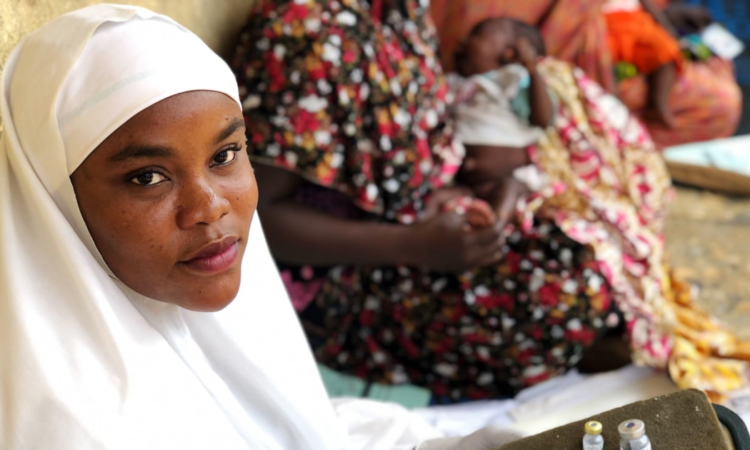
Profile
Sections
tv
Featured
More From NBC
Follow NBC News
There are no new alerts at this time
KANO, Nigeria — Amina Anas wanted more information before getting her baby boy vaccinated against polio.
Anas, who lives in a village in northern Nigeria, spoke to other women in the community about her concerns. Ultimately, Aisha Shuaibu Mohammad, a UNICEF-trained volunteer, was able to convince her.
Mohammad is one of hundreds of Nigerian women who have spearheaded the country’s fight against polio by becoming vaccinators.
The women are close to being able to declare victory: Aug. 21 will mark three years since Nigeria’s last case of polio, said Dr. Anis Siddique, UNICEF’s chief of communication for development who led the polio team. In the northern state of Kano, where Anas lives, there hasn’t been a case in five years, Siddique said.
Siddique is cautiously optimistic that the country will receive World Health Organization certification for polio eradication in October — a country must go three years without a case, and the WHO routinely waits two months after the three-year mark to make an official declaration, he said.
This won’t be the first time Nigeria has been declared polio-free. In 2015, the WHO declared that polio had been eliminated, but a 2016 outbreak wiped out the designation.
To eliminate polio, women — mostly young mothers — have gone door-to-door, slipping drops of polio vaccine under the tongues of as many as 30 million Nigerian children. The volunteers work with UNICEF and the Bill & Melinda Gates Foundation and have received clinical training to properly administer the vaccine.
In Nigeria, the vast majority of vaccinators are women. That’s crucial to ensuring that vaccines reach every child, because men — with the exception of husbands and close male family members — are prevented from entering households. This rule is strictly enforced in the northern and middle belt regions of Nigeria, where Islam predominates.
Mohammad, the UNICEF-trained volunteer, admitted that it’s impossible to convince every woman to vaccinate her children, but said that she sees successful cases every day.
“Once we talk to women like Amina, they usually open up. We not only give vaccines … we discuss their fears about the medicine, proper hygiene and sanitation, and even prenatal care,” Mohammad told NBC News.
She said that with the help of volunteer community members, “we send reminders every Monday to all new mothers in the community that there will be a vaccine clinic the following day. We are here every Tuesday.”
As in the United States, there’s some skepticism surrounding vaccines in Nigeria. But the similarities end there: Some anti-vaccination myths in Nigeria are put forth by the violent militant group Boko Haram, and volunteers may be the target of violence. In 2013, two Kano vaccination teams were murdered.
But Michael Galway, deputy director of the Polio Team at the Bill & Melinda Gates Foundation, said that opposition to vaccines is no longer as a big a challenge as it once was. Now, only 1 percent of people are not getting vaccinated because they refuse the vaccination, Galway said.
More challenging is simply reaching people. Large nomadic populations live along Nigeria’s borders. Last year, the WHO renewed efforts to vaccinate children regularly crossing into and out of the country by supporting the government in an initiative to improve vaccination efforts in the northwest region of the country.
Alasan Isa, the village head of a small rural community in Minjibir, Nigeria, said that seeing the devastating effects of polio has led him to encourage women to become volunteers and vaccinators.
“I have seen how even one case of polio can devastate a community. I don’t ever want to see polio again … a child with paralytic polio cannot move and often they cannot work in the future. It’s not a way to live,” Isa said.
In many parts of Nigeria, the polio vaccine is given orally, as drops under the tongue. This form of the vaccine is easy to administer — unlike an injection, it can be given by anyone. However, because the oral vaccine uses a live version of the virus, it carries the very small risk that the virus can mutate and cause disease, the WHO says. These cases only occur in areas where overall vaccination rates are very low, leaving people susceptible to the virus.
Siddique, of UNICEF, stressed that the benefits of getting vaccinated far outweigh the small risk.
When outbreaks of so-called vaccine-derived polio do occur, they are kept under control and generally do not cause paralysis, Galway noted. What’s more, these cases should not take away from the milestone that may soon be reached.
“Providing these vaccines is part of our long-standing commitment to child survival,” Galway said. “It takes meticulous state level programs to interrupt transmission. In 2016, we almost reached a polio-free level in Nigeria, but we fell short. This time, I hope we can declare that Africa is certified as free of polio.”
Follow NBC HEALTH on Twitter & Facebook.
Dr. Shamard Charles is a physician-journalist for NBC News and Today, reporting on health policy, public health initiatives, diversity in medicine, and new developments in health care research and medical treatments.
© 2023 NBC UNIVERSAL







